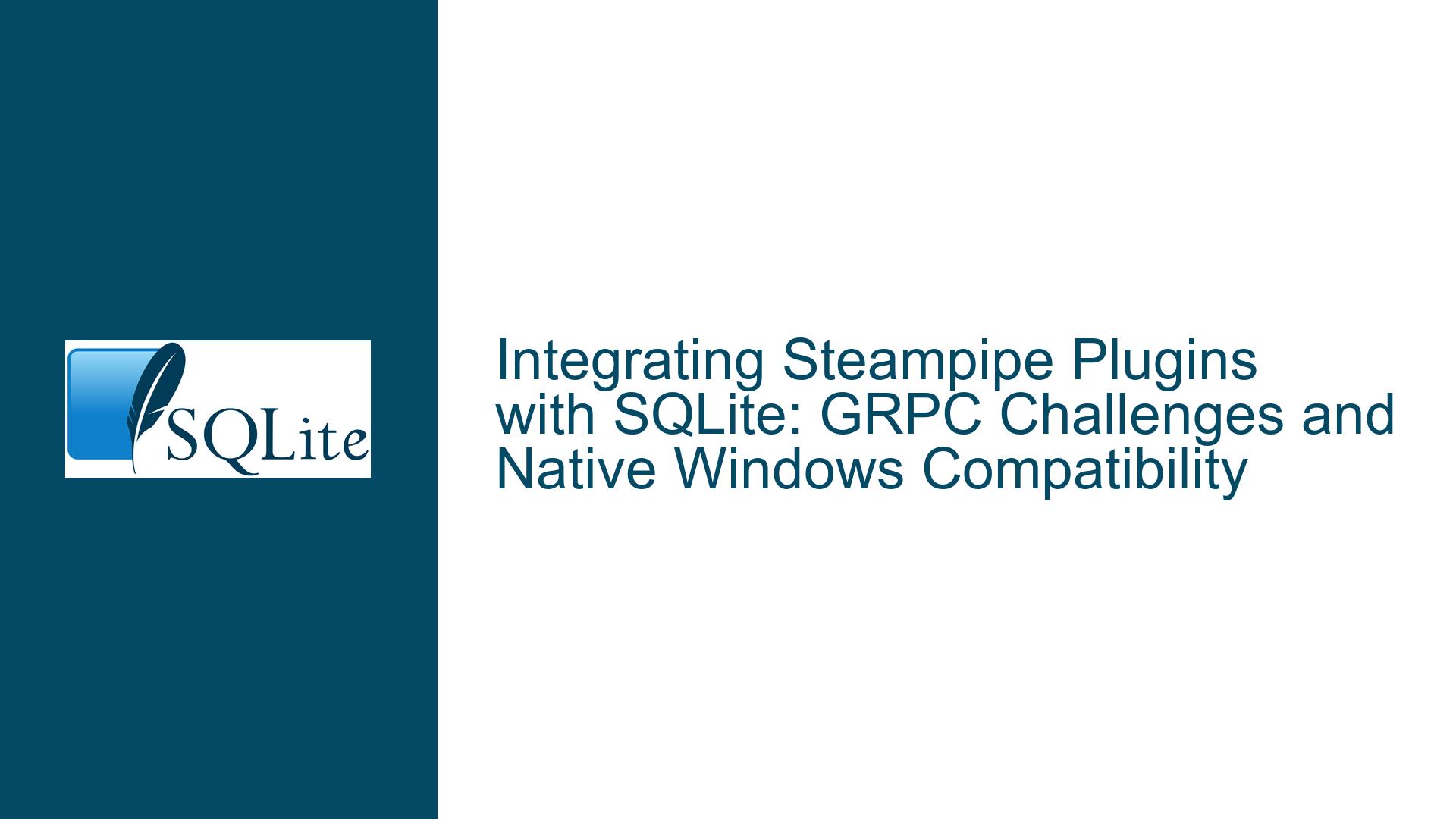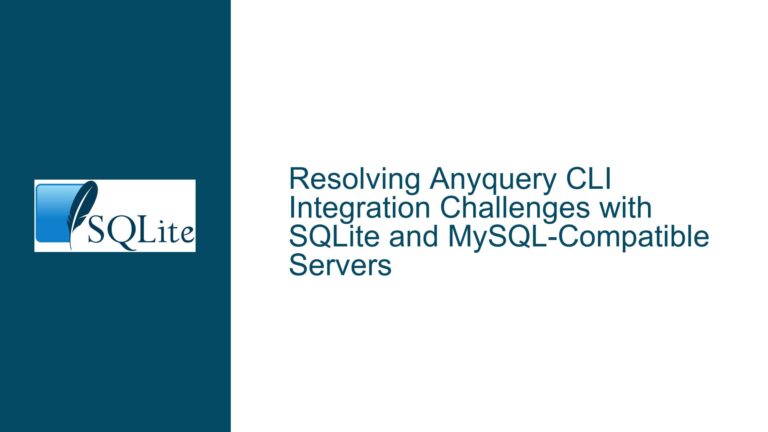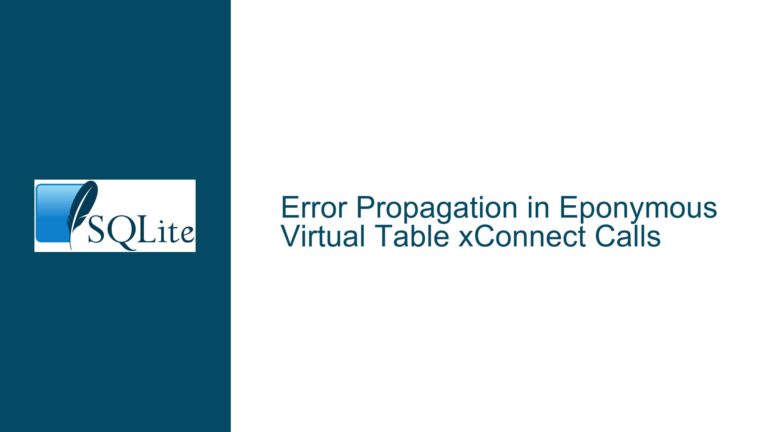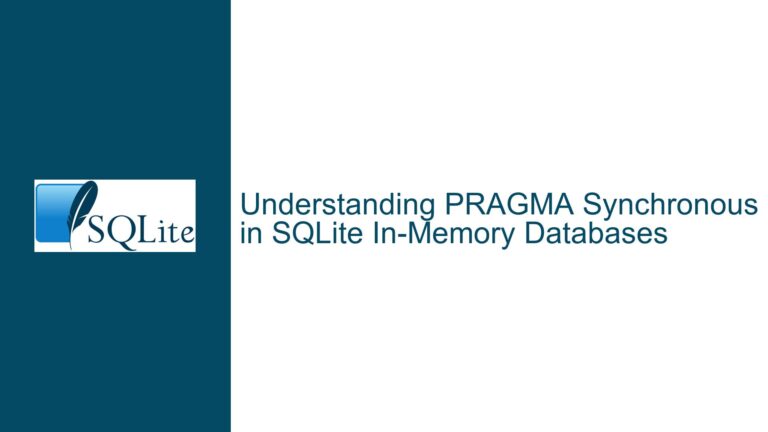Integrating Steampipe Plugins with SQLite: GRPC Challenges and Native Windows Compatibility
Steampipe Plugin Integration with SQLite: GRPC Architecture and Query Execution
The integration of Steampipe plugins with SQLite introduces a powerful capability to map APIs to database tables, enabling SQLite developers to query external APIs directly from within SQLite. However, this integration is not without its challenges, particularly concerning the underlying GRPC architecture and the need for native Windows compatibility. The core issue revolves around the necessity of GRPC servers for in-process plugins and the limitations this imposes on lightweight, direct integration with SQLite.
Steampipe plugins, originally designed for Postgres, rely heavily on GRPC for communication between the plugin and the database engine. When these plugins are adapted for SQLite, the GRPC architecture remains a fundamental component, even when the plugin is loaded as an SQLite extension. This raises questions about the efficiency and necessity of GRPC for in-process plugins, especially when developers aim for a more streamlined, direct integration without the overhead of GRPC.
The challenge is further compounded by the desire to run these plugins natively on Windows, as opposed to relying on WSL2 (Windows Subsystem for Linux). Native Windows compatibility is a significant consideration for developers who prefer or require a Windows-native environment for their workflows. The current reliance on WSL2 for running Steampipe plugins on Windows introduces additional complexity and may not be feasible for all use cases.
GRPC Dependency in In-Process Plugins and Native Windows Constraints
The dependency on GRPC for in-process plugins is a critical factor that affects the design and implementation of Steampipe plugins in SQLite. GRPC, a high-performance, open-source universal RPC framework, is designed for communication between services, often over a network. However, when used in-process, as is the case with SQLite extensions, the necessity of GRPC becomes less clear. The primary concern is whether the GRPC layer adds unnecessary complexity and overhead to the plugin architecture, especially when the plugin and the database engine reside in the same process.
In the context of SQLite, which is renowned for its lightweight and embedded nature, the inclusion of GRPC for in-process communication may seem counterintuitive. SQLite extensions typically operate within the same process space as the SQLite engine, allowing for direct function calls and efficient data exchange. Introducing GRPC into this environment could potentially negate some of the performance benefits that SQLite offers, particularly in scenarios where low latency and minimal resource usage are paramount.
Moreover, the GRPC dependency poses challenges for native Windows compatibility. GRPC, while cross-platform, often requires additional configuration and dependencies when running on Windows. This can complicate the deployment and operation of Steampipe plugins in a Windows-native environment. Developers who prefer to avoid the overhead of WSL2 may find it difficult to achieve seamless integration of Steampipe plugins with SQLite on Windows due to these GRPC-related constraints.
Streamlining Steampipe Plugin Integration: GRPC Alternatives and Native Windows Solutions
To address the challenges posed by GRPC dependency and native Windows compatibility, several approaches can be considered. These include exploring alternatives to GRPC for in-process communication, optimizing the GRPC implementation for SQLite extensions, and ensuring robust support for native Windows environments.
One potential solution is to develop a lightweight communication layer that replaces GRPC for in-process plugins. This layer could leverage direct function calls or shared memory for efficient data exchange between the plugin and the SQLite engine. By eliminating the need for GRPC in in-process scenarios, this approach could reduce overhead and simplify the integration process. However, this would require significant changes to the Steampipe plugin architecture and may not be feasible in the short term.
Another approach is to optimize the existing GRPC implementation for SQLite extensions. This could involve minimizing the GRPC overhead by reducing the number of RPC calls, optimizing serialization and deserialization processes, and leveraging GRPC features such as streaming and batching. By fine-tuning the GRPC implementation, it may be possible to achieve acceptable performance levels while retaining the benefits of GRPC for plugin communication.
For native Windows compatibility, efforts should be made to ensure that Steampipe plugins can run seamlessly on Windows without relying on WSL2. This may involve addressing platform-specific issues related to GRPC, such as dependency management and configuration. Additionally, providing clear documentation and tools for Windows developers can help facilitate the adoption of Steampipe plugins in native Windows environments.
In conclusion, while the integration of Steampipe plugins with SQLite offers exciting possibilities for API access and data querying, the challenges posed by GRPC dependency and native Windows compatibility must be addressed. By exploring alternatives to GRPC, optimizing the existing implementation, and ensuring robust support for Windows, developers can unlock the full potential of Steampipe plugins in SQLite, enabling a more streamlined and efficient workflow for API-driven data access.






